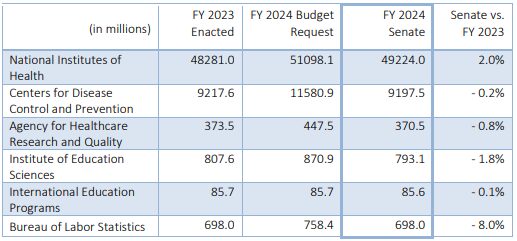Issue 16 (August 8)
Analysis of the Senate FY 2024 Labor, Health and Human Services, Education, and Related Agencies Appropriations Bill
On July 27, the Senate Appropriations Committee successfully completed work on all 12 of its annual appropriations bills, a feat that has not been accomplished in five years. Among the bills included in the final markup session was the Fiscal Year (FY) 2024 Labor, Health and Human Services, Education (LHHS) Appropriations Bill. The Senate LHHS bill contains annual funding proposals for the National Institutes of Health (NIH), Department of Education (ED), Centers for Disease Control and Prevention (CDC), Agency for Healthcare Research and Quality (AHRQ), and Bureau of Labor Statistics (BLS), among other federal departments and agencies.
As previously reported, the Senate appropriations bills were written to comport with the FY 2024 budget caps that were agreed to earlier in the summer. The caps resulted in near-flat funding and even cuts to science agencies across the Senate bill, with a few notable exceptions:

Lawmakers in both chambers have officially left town for their month-long August recess. Notably, the House adjourned without making progress on their FY 2024 spending bills, largely due to in-fighting within the Republican majority. We are in store for a contentious fall when the House and Senate will be faced with taking action in appropriations or risk a government shutdown come October 1.
COSSA recently published a full analysis providing details on the Senate’s LHHS appropriations bill for FY 2024 for federal agencies and programs important to the social and behavioral science research community.
The bill text and accompanying report are available on the Senate Appropriations Committee website.
Stay tuned to COSSA’s coverage for the latest developments.
Read on to review details on the Senate’s LHHS appropriations bill for FY 2024 for federal agencies and programs important to the social and behavioral science research community.
Researchers from York St John University Answer “Why Social Science?”
The most recent Why Social Science? post comes from The Conversation, where Dr. Clare Cunningham, Dr. Catherine Heinemeyer, and Dr. Jude Parks write about how social and behavioral science can help students find their place in fighting climate change. Read on for more.
Representative Tonko Reintroduces Scientific Integrity Act
On July 25, Representative Paul Tonko (D-NY) reintroduced the Scientific Integrity Act alongside Ranking Member of the House Science, Space, and Technology Committee, Zoe Lofgren (D-CA), Representative Haley Stevens (D-MI), Representative Suzanne Bonamici (D-OR), Representative Don Beyer (D-VA), and Representative Brian Fitzpatrick (R-PA). The bill was previously introduced by Representative Tonko during the 117th Congressional session (see previous COSSA coverage).
Representative Tonko released a fact sheet for the bill, citing that it’s intended to improve public trust in science and prevent political or special interests from interfering with the dissemination of scientific information and formation of scientific public policy. Under the act, federal agencies that fund public science would be directed to detail scientific integrity principles and hold public scientists to those principles while also protecting their rights.
Stay tuned to COSSA’s continued coverage.
NIH Releases RFI For Biomedical and Behavioral Science Research
The Common Fund of the National Institutes of Health (NIH) has issued a request for information for challenges, opportunities, workshops, pilot initiatives, and other potential programs anticipated to advance areas of science within biomedical and behavioral research. The Common Fund is intended to support short-term, high-risk initiatives with the potential for high impact. To this end, NIH requests that submissions consider the potential impact on human health as well as the expected results within 5-10 years.
The deadline for submissions is August 11.
U.S. Census Bureau Announces Virtual Workshop on Race, Ethnicity, and Inequality
The U.S. Census Bureau has launched a new initiative to expand understanding of race, ethnicity, and inequality in the U.S. The initiative focuses on increasing data accessibility for underserved researchers, refining methodologies about racial disparities, and nurturing a specialized community of experts.
The virtual workshop, set for November 14-15, 2023, aims to gather insights on effective data representation of race and ethnicity, as well as spotlight systemic inequalities within society.
The Census Bureau welcomes research submissions from diverse disciplines that emphasize racial disparity analysis across an array of sectors, including health, education, and employment among others. Submissions will also concentrate on any enhancements in measuring racial demographics, innovative uses of administrative records, and pioneering methodologies for documenting inequality.
Researchers are encouraged to submit their papers by August 14 to census.race.ethnicity.inequality.workshop@census.gov. Learn more about the workshop or submission requirements here.
Call for Nominations: The FABBS IDEA Award
The Federation of Associations in Behavioral and Brain Sciences (FABBS) is welcoming nominations for the Award for Inclusivity, Diversity, Equity, and Accessibility – or IDEA Award – to recognize and honor distinguished research, professional practice, and activities, that advance these principles in the behavioral and brain sciences.
There are two award categories listed:
- The Lifetime Achievement IDEA Award for Senior Scholars
- The Kellina Craig-Henderson IDEA Award for Early to Mid-Career Scholars, in memory of Kellina Craig-Henderson, who led the Social, Behavioral and Economic Sciences (SBE) Directorate from January to June of 2022, following over 16 years of service to the National Science Foundation (NSF).
FABBS is encouraging nominations of scientists from minoritized communities and from disciplines and subject matters that have been traditionally under-represented in the behavioral and brain sciences.
The winner(s) of the IDEA award will be announced at the FABBS annual meeting in December and will receive $1,000, a plaque, and be featured in an article in the FABBS newsletter and website.
The deadline to submit nominations is September 15. Learn more about the submission process and guidelines here.

